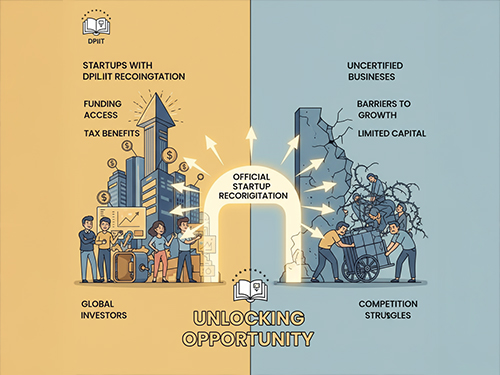Every Entity Registered Is Not a Startup

Every Entity Registered Is Not a Startup – Then Which One?
When the Government of India launched the Startup India Initiative in January 2016, it marked a turning point in the nation’s entrepreneurial journey. For the first time, innovation and entrepreneurship were given a structured platform with policy support, incentives, and recognition.
However, even after years of progress, a common misconception persists: “If I have registered a company, it is automatically a startup.” The truth is more nuanced. Not every registered business qualifies as a startup under the government’s framework. Only those entities that meet the Department for Promotion of Industry and Internal Trade (DPIIT) criteria can be officially recognized and enjoy the benefits of Startup India.
Who Really Qualifies as a Startup?
DPIIT has laid down clear guidelines to ensure that the startup ecosystem focuses on innovation-driven, growth-oriented businesses — not just any commercial activity. Let’s break down the conditions:
1. Type of Entity
Only certain registered structures qualify:
- Private Limited Company under the Companies Act, 2013
- Limited Liability Partnership (LLP) under the LLP Act, 2008
- Partnership Firm under the Partnership Act, 1932
Proprietorships, HUFs (Hindu Undivided Families), and unregistered businesses are not eligible for startup recognition.

2. Age of the Entity
- The company should not have completed 10 years from the date of its incorporation.
- This ensures that recognition supports young businesses still in their growth phase, not established corporations.
3. Turnover Criteria
- The annual turnover must not exceed ₹100 crore in any financial year since incorporation.
- This threshold ensures the focus remains on emerging ventures, not already large and mature businesses.
4. Innovation and Scalability
This is the heart of startup recognition:
- The entity must be engaged in innovation, development, or improvement of products, processes, or services, or
- Have a scalable business model with high potential for employment generation or wealth creation.
In simple words: the government supports companies that bring something new, impactful, and scalable to the table.
5. Exclusion Clause
- If a company is formed by splitting up or reconstructing an existing business, it does not qualify as a startup.
- This prevents older businesses from rebranding themselves as “startups” just to gain benefits.
Why This Distinction Truly Matters?

The Startup India initiative offers a host of benefits:
- Tax holidays for eligible startups
- Self-certification for labor and environmental compliance
- Intellectual property support (patent filing fee rebates, fast-tracking)
- Easier exit options for winding down failed ventures
- Funding opportunities through government-backed funds
If every registered business — including trading firms, traditional shops, or professional practices — were treated as startups, these benefits would be diluted.
The purpose of Startup India is not to reward every business, but to encourage new-age ventures that:
-
- Push boundaries with innovation
- Solve real-world problems
- Create large-scale jobs
- Strengthen India’s position as a global hub of innovation
Conclusion
Registering a business entity is just the first step. It doesn’t automatically make you a startup.
To truly wear the “startup” badge, your company must be:
- Young (under 10 years old)
- Lean (turnover under ₹100 crore)
- Innovative and scalable (with real potential to grow and create impact)
- Recognized by DPIIT
So, the next time someone says, “I’ve registered a company, so it’s a startup”, remember — it’s not registration alone, but recognition and innovation that define a true Startup in India.





Leave a Reply